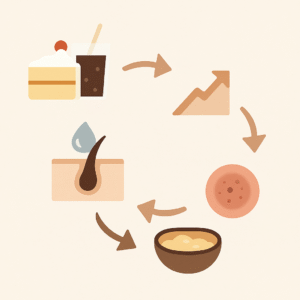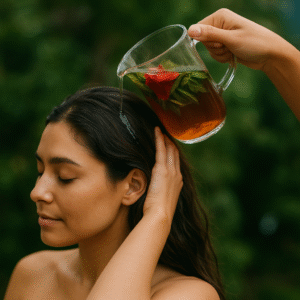Herbal Water Bath: Ancient Healing Ritual for Skin, Mind & Soul
Bathing is often seen as a daily chore, but in Ayurveda and holistic traditions, water is more than a cleanser — it is a carrier of healing, energy, and transformation. Across cultures, people have practiced herbal water baths to purify the body, relax the mind, and elevate the spirit. Modern science now confirms what ancient wisdom has always known: water infused with natural herbs can soothe skin, fight bacteria, calm stress, and even enhance emotional well-being.
This blog dives into the art and science of bathing in herbal water — exploring its skin benefits, spiritual depth, and practical ways you can integrate this simple yet powerful ritual into your daily life.
The Science Behind Herbal Water Baths
Water is a universal solvent. When we boil herbs like neem, tulsi, or rose petals in water, active compounds are released. These phytochemicals — antioxidants, flavonoids, essential oils, and antimicrobial agents — remain in the water and come in direct contact with the skin during bathing.
Research insights:
-
Neem is rich in nimbidin and azadirachtin, compounds with antibacterial and antifungal properties.
-
Tulsi (Holy Basil) contains eugenol and rosmarinic acid, known for stress reduction and immune support.
-
Rose petals are abundant in polyphenols that soothe inflammation.
-
Vetiver roots release khusimol, a natural cooling compound that balances excess body heat.
-
Turmeric provides curcumin, a powerful anti-inflammatory and skin-brightening agent.
-
Amla (Indian Gooseberry) is rich in Vitamin C, vital for collagen production and skin vitality.
Together, these herbs transform water into a therapeutic medium for health and renewal.
Benefits of Herbal Water Bathing
Neem Water Bath
-
Clears acne, rashes, and skin infections
-
Controls body odor naturally
-
Supports overall skin hygiene
Tulsi Water Bath
-
Boosts immunity through skin absorption of antioxidants
-
Calms the nervous system and reduces stress
-
Refreshes skin with a subtle fragrance
Rose Petal Water Bath
-
Soothes irritation and redness
-
Moisturizes skin, leaving it soft and supple
-
Uplifts mood with its natural fragrance
Vetiver (Khus) Water Bath
-
Acts as a natural body coolant
-
Prevents prickly heat and rashes
-
Improves skin texture and balances pH
Turmeric Water Bath
-
Reduces swelling and inflammation
-
Brightens complexion and removes dullness
-
Purifies skin, preventing infections
Amla Water Bath
-
Strengthens skin barrier and collagen
-
Adds natural glow and vitality
-
Nourishes both skin and hair
The Holy Dip Theory: Water as a Spiritual Healer
In Ayurveda, bathing is seen as snana — a sacred act where water absorbs negativity and restores balance.
When you step into a herbal water bath with intention, it becomes a holy dip ritual:
-
Whisper a prayer or affirmation while bathing
-
Release negative habits, thoughts, or emotions
-
Let the water symbolically wash away what no longer serves you
Psychology studies confirm that water rituals reduce stress, enhance mindfulness, and support emotional release.
Wisdom Line: Every drop cleanses the body, and heals the soul.
How to Prepare a Herbal Water Bath
-
Choose your herb: neem, tulsi, rose petals, turmeric, amla, or vetiver
-
Boil: Add a handful to 1–2 liters of water, boil for 10–15 minutes
-
Cool slightly: Allow to reach lukewarm temperature
-
Mix: Add to your bathing water (bucket/tub)
-
Step in mindfully: Repeat a positive affirmation as you bathe
💡 Pro Tip: Rotate herbs through the week — neem for cleansing, rose for soothing, tulsi for refreshing, turmeric for glowing, amla for strengthening, and vetiver for cooling.
Practical Tips to Integrate Herbal Baths Daily
-
Use dried powders (neem, turmeric, hibiscus) when fresh herbs aren’t available
-
Add essential oils (tulsi, vetiver, rose) for added benefits
-
For summer, use vetiver and rose; for winter, turmeric and tulsi
-
Suitable for children and elders (especially neem and tulsi baths)
-
Always patch test before trying a new herb
-
Even 1–2 herbal baths per week can show visible improvements
Frequently Asked Questions
1. Can I mix multiple herbs?
Yes, but stick to 2–3 at once. Neem + tulsi or rose + vetiver are great pairs.
2. Is it safe for sensitive skin?
Yes, especially rose and vetiver. Always patch test first.
3. Can I store herbal-infused water?
Best used fresh, but can be stored up to 24 hours in glass.
4. Does it replace soap or shampoo?
No, it complements your mild cleanser.
5. Can children take herbal baths?
Yes, with mild concentrations — neem or tulsi are ideal.
Final Thoughts
A herbal water bath is not just a skincare ritual — it’s a soul-care ritual. From neem’s cleansing power to rose’s calming fragrance, every herb carries both healing compounds and ancient wisdom.
By embracing this practice, you refresh your body, calm your mind, and align with nature’s rhythm.
✨ Next time you step into water, remember:
It is not just a bath. It is a healing dip that cleanses your body, mind, and soul.



Leave a Reply